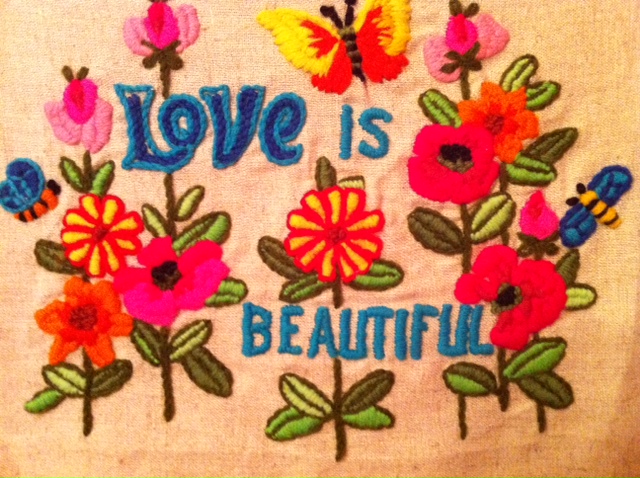Here’s a piece of information about myself I didn’t know before: never leave me alone with a pair of cuticle nippers while in a nervous mental state.
The other day, I published a piece for shareable.net about dumpster diving. The wonderful and influential parenting blog, Motherlode, over at the New York Times website picked it up and excerpted it. What followed ended up being a storm of recrimination that I should have predicted, but didn’t.
It’s almost freeing when you receive so much bad feedback, so much anger and name-calling, so much deeply profound criticism of yourself and your life–suddenly, I’m just not that impressed if you don’t like me or what I’m doing. Pshaw, says my waved forearm. That’s all you’ve got? That’s nothing.
The recurring theme seemed to be that I must be trying to generate sympathy, and that I don’t deserve it. (Your darn-tootin’ I don’t deserve sympathy. Nor am I asking for it.) Those who clearly hadn’t read the source article saw “previously affluent, now forced to dumpster dive!” summation, and the derision this inspired made for a crazy media ride including inquiries from European weeklies and many hot-headed reprints by websites and blogs hoping to muckrake me into shamed submission. For a while, I fell into the rabbit-hole of trying to respond and defend myself in the various commentary threads. This did little or nothing to quiet the din.
What I kept trying to explain were the following points: that I wasn’t fishing for sympathy, a book deal, financial donations, or news appearances. That I hadn’t gone overnight from “affluent” to “dumpster diver.” And that my writing has nothing to do with me wanting to be a role-model or spokesperson for green living post-Recession. It’s true that I’m writing a personal narrative about the choices we’ve made since the economy hit its downturn, and that a lot of these changes have resulted in us being a more “green” family, and (I’d like to think,) better neighbors and citizens. I feel like I am required to repeat, however, that I know I’m unworthy of praise. And that I’m fully aware of the fact that if our family’s micro-economy hadn’t demanded it, we wouldn’t have become the poster children for ecological family-living that we are accused of trying to be.
I was soundly criticized for staying home to write, babysit other people’s children, and clean other people’s houses versus taking a bus to a menial job at a fast food restaurant (or some-such) at night, passing the parenting baton at shift changes with my husband, who currently works a low-paying day shift at a retail store. Yes, we have made the decision that living that way would be a net negative, and not necessarily make much difference in the bottom line of family finances. We did make that choice, and it’s one that many find absolutely unsupportable.
Once our two youngest children are in public school, well, at that point, things will change. I have no problem doing even the most humble work, and I will spread my net far and wide when more of our daytime hours are freed from family requirements. For now, though, this is what’s working best, and I would like to think we are more of an asset to our community than a burden.
The one commonality of the hostile comments that struck me as most curious was the seeming fury of those who think it’s absolutely condemnable to be both poor and “organically-minded.” I was dismissed as some kind of Kabbalah-thread wearing, eating-praying-loving brand of Whole Foods snob, unwilling to schlep with the kids into Wal-Mart where I could shop smart and live better. I can tell my detractors this: you’re damn right. I’m not quite the brand of pretentious you describe, but I am the kind of parent who thinks there has to be a better way to eat well when you’re poor than consign yourself to crap. And that isn’t going to change, no matter how much rage is volleyed over my way.
I am left wondering: will shopping with an eye for the quality of your food ever shirk its pretentious associations? Foolishly, I had convinced myself that folks were paying attention to this worthy cause; that Food, Inc., Supersize Me, and Michael Pollan’s best-sellers had made a difference in the zeitgeist. I can say with fair certainty that we’re not there yet. Organic, local, grass-fed—that’s still high-falutin’ city slicker talk. Feeding your kids the absolute cheapest way possible is still considered a praise-worthy sacrifice. And eating better is not always the more expensive choice, as some point out: bulk beans and grains are cheap, and avoiding meat and processed foods helps enormously. But that’s not the argument most are making. Mostly, the argument is that if you’re poor, you have no right to even think about breaking out of the ramen noodle ghetto.
I think we have to reinvent “poor.” Most everyone in my life is enduring new poverty to some extent. We talk here on shareable about the need to build community, to combine or barter resources, to network with each other, to share the burden. It’s an unfamiliar and scary leap to consider getting rid of your car, downsizing your home, or giving up your cable and internet—even if only for awhile, until things settle for your family. And if it turns out that some of these changes feel good, well, then it’s a win-win. The Great Recession is a watershed time for my generation, possibly the era that will live on to define us. And your family’s narrative—the struggles, stubborn pretensions, learning processes, and ethical triumphs–is as valid as anyone’s.
See you in the dumpster!









